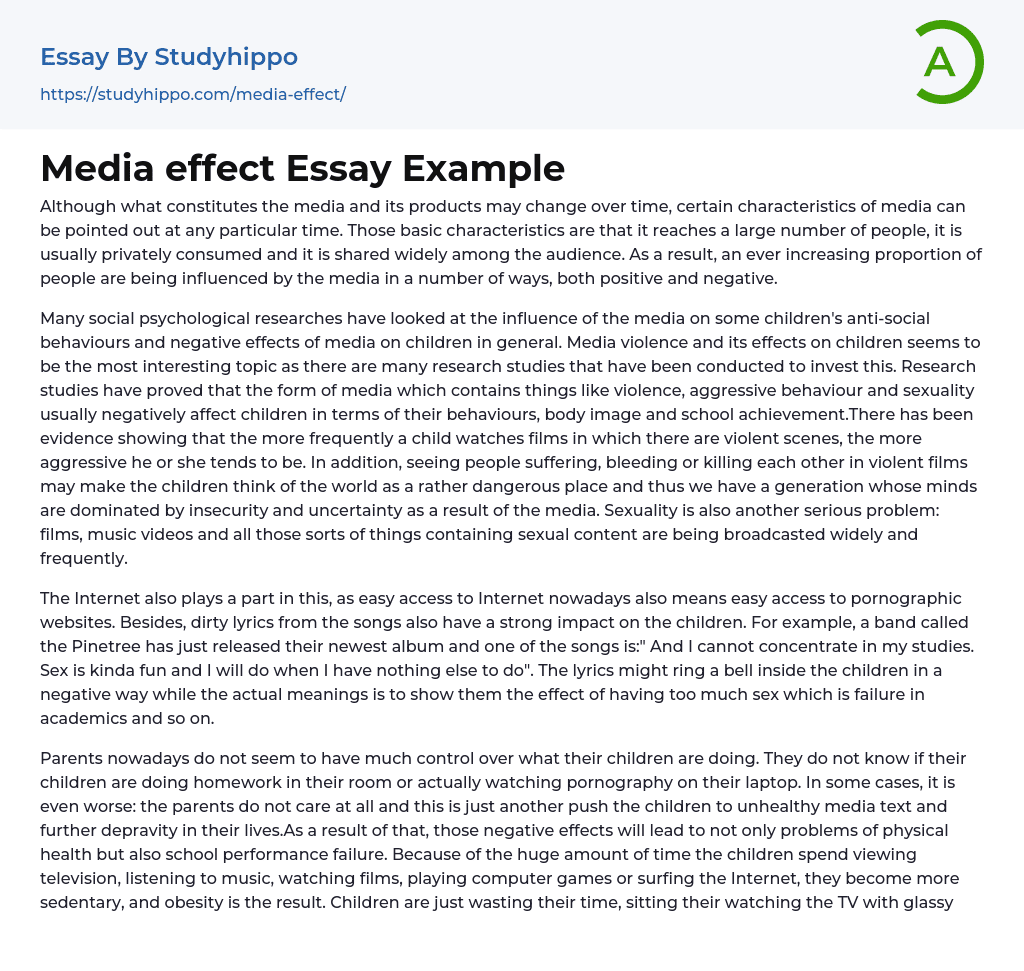Despite the ever-changing nature of media and its content, certain enduring qualities persist, such as widespread accessibility, personal consumption, and widespread dissemination in society. As a result, an increasing number of people are vulnerable to both favorable and unfavorable effects of media influence.
Research in social psychology has investigated the effects of media on children's development and behavior, uncovering negative outcomes. A key focus is the impact of violent media, which consistently shows that exposure to aggressive content can have detrimental effects on children's self-esteem, academic achievement, and conduct. Those who watch violent movies frequently are more likely to display aggression, while depictions of suffering and death may make young viewers feel less secure about the world around them. Furthermore, sexually explicit material in movies and music videos poses a significant worry as it is
...widely accessible.
Children can easily access pornography on the Internet, which can have negative effects. Furthermore, inappropriate song lyrics like those in the Pinetree's latest album may also impact children negatively. The song "And I cannot concentrate in my studies. Sex is kinda fun and I will do when I have nothing else to do" could lead children to prioritize sexual activities over their studies, ultimately resulting in academic failure.
Nowadays, it appears that parents have little control over their children's actions. It is uncertain whether their children are completing homework or viewing pornography on their laptops. In some cases, parents are indifferent which leads their children towards harmful media and depravity. This can result in physical health issues and poor academic performance due to the considerable amount of time spent watching TV, listening to music, playing video games, watching movies, or
browsing the internet, causing them to become less active and leading to obesity. Children waste valuable time with vacant stares, lacking cognitive development or physical exercise.
Children may experience a decline in sociability and an increased risk of depression and other psychological ailments. There may also be negative impacts on their academic performance due to less time spent on assignments while spending more time watching TV. Media has seemingly glamorized the use of tobacco, alcohol, and drugs. Advertisers aim to sell their products by designing persuasive content targeted towards potential consumers.
Renee Hobbs, an esteemed psychologist specializing in the influence of media on children, states that advertisements have the potential to make certain products appear desirable and encourage kids to try them. However, Hobbs notes that only children who lack media literacy skills are susceptible to such messages and not all youngsters. Those with adequate analysis abilities remain unaffected by media's impact while some may even reap its benefits.
With the aid of technology, children now have easier access to educational resources through various forms of media. Educational programs and software are highly praised for their effectiveness in providing enriching learning experiences. Moreover, technological advancements allow exposure to social issues, arts, and other activities. The Kaiser Family Foundation reports that only a small 9 percent of kids spend over an hour on computers for leisurely purposes while a vast majority (82 percent) engage in reading. While concerns exist regarding the negative impact of drug advertisements aimed at children via magazines and newspapers, media outlets also provide factual health information detailing risks such as smoking hazards.
Moreover, displaying before and after images of drug and alcohol abusers serves as
a warning to kids about the hazards of such conduct. Furthermore, exposure to violent media has been associated with heightened aggression in people. Nonetheless, media can also aid children in distinguishing between reality and fantasy depicted in movies. In conclusion, although media may have some benefits for youngsters, its adverse effects on them are more significant.
Despite educational messages being less attractive to children when compared to violent ones, there is no definitive proof linking media exposure to anti-social behavior. It remains a contentious topic and further research is required for a complete comprehension of whether media has a favorable or unfavorable influence on children.
- Media Violence essays
- Domestic Violence essays
- Violence in Video Games essays
- Gun Violence essays
- Video Game Violence essays
- Violence Against Women essays
- Youth Violence essays
- Child essays
- Child labor essays
- Childcare essays
- John Locke essays
- 9/11 essays
- A Good Teacher essays
- A Healthy Diet essays
- A Modest Proposal essays
- A&P essays
- Academic Achievement essays
- Achievement essays
- Achieving goals essays
- Admission essays
- Advantages And Disadvantages Of Internet essays
- Alcoholic drinks essays
- Ammonia essays
- Analytical essays
- Ancient Olympic Games essays
- APA essays
- Arabian Peninsula essays
- Argument essays
- Argumentative essays
- Art essays
- Atlantic Ocean essays
- Auto-ethnography essays
- Autobiography essays
- Ballad essays
- Batman essays
- Binge Eating essays
- Black Power Movement essays
- Blogger essays
- Body Mass Index essays
- Book I Want a Wife essays
- Boycott essays
- Breastfeeding essays
- Bulimia Nervosa essays
- Business essays
- Business Process essays
- Canterbury essays
- Carbonate essays
- Catalina de Erauso essays
- Cause and Effect essays
- Cesar Chavez essays




